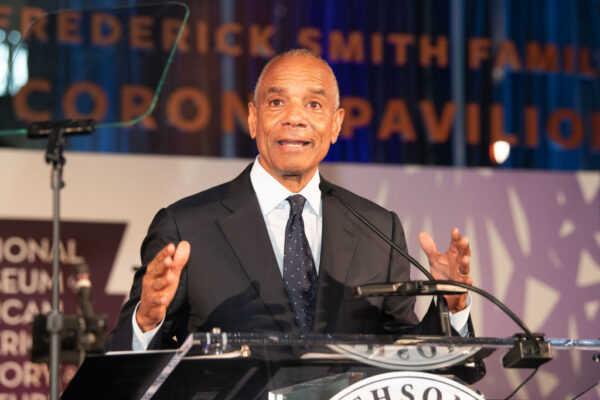When he took the helm at American Express Company, Kenneth Chenault became the first African-American chief executive officer of a Fortune 500 firm. He was CEO of the multinational corporation from 2001 to 2018.

Chenault, who grew up on Long Island, New York, as the son of a dentist and a dental hygienist, went to the alternative Waldorf School, which had a more holistic approach to education, stressing that students develop their intellectual, artistic and practical skills. It is said that it was during his time at Waldorf that he first developed leadership skills. He served as senior class president and as a captain of sports teams.
He went on to major in history at Bowdoin College, earning his bachelor of arts degree in 1973. He furthered his education at Harvard University Law School, graduating in 1976. He took a position at a law firm and then a management consultancy before joining AmEx in 1981.
Despite the challenges as one of the few Black executives with the company, he rose up the ranks. In 1997, he was appointed chief operating officer and president. In 2001, he was named CEO.
He had to pull the “company through a recovery from the September 11 attacks in 2001, in which American Express lost 11 employees and suffered damage to its headquarters,” according to Britannica. Chenault increased the company’s market share and profitability. One way was to partner with banks and allow them to issue credit cards through American Express. Despite pushback from competitors MasterCard and Visa, Chenault sealed partnerships with more than 85 banks in more than 90 countries by 2005.
In his first two years as CEO, he grew the company’s revenue from $150 million to $500 million, Inc. reported.
In 2017, he stepped down as CEO. He became chairman and managing director of General Catalyst Partners, a venture capital firm, in 2018.
Here are five success lessons from Chenault.
1.Getting Through a Crisis: ‘Keep Your Composure’
American Express faced morale and economic challenges following 911 and Chenault had to find a way to overcome them.
“[9/11] was one of the most horrific situations that the world and the country has faced and that was my first year as CEO of the company. One of the things that I strongly believe in and it is a leadership mantra that I literally think about every day is that the role of a leader is to define reality and to give hope. I was shocked as anyone would be and then I thought first of the people — people in the World Trade Center, people in the world, our employees, our customers — and what could we do,” he told Carla Harris, vice chairman of Morgan Stanley, at the third-annual Senior Multicultural Leadership Conference hosted by Morgan Stanley in New York City in 2018.
“But what you need to understand is that you can’t lose your cool; you have to keep your composure in a leadership position. People will be empathetic, but they won’t follow you if you don’t keep your composure,” he added.
2. Don’t Be Afraid of Innovation: ‘Constantly Challenge the Status Quo’
“Most people, it’s natural, are really scared of change. What you have to communicate, emphasize, and demonstrate is to embrace change. If you want to be a leader and lead as a company, you have to constantly challenge the status quo,” Chenault told Harris.
But knowing when to change is also key. “The change should not be [due to] competitive threats. if you change because you’re scared, chances are you are going to have a problem,” he pointed out. “If you really want to be an innovator, you have to be very customer-centric, have the willingness to do some of the things to challenge the status quo, and have the willingness to have people say, ‘I don’t know why they’re doing this; they can fail.’ Let’s be very clear and understand all possibilities and all contingencies needed to be dealt with but this relentless drive to innovate is something that I emphasize. And then what you have to do within the organization, not by hierarchy, is take ideas from every level and support those ideas.”
3. Be Decisive
According to Chenault, good leaders should ask themselves: ” “How consistent are my words and actions?”
“Your answer to this question will tell you whether you are leading your life or your life is leading you,” wrote Robert Chen, partner at Exec-Comm, in an article posted on LInkedIn. “Ken [stresses] that all leaders should clarify their values and know their priorities. What do you live for? What’s the inspiring vision you have for your life?”
Chenault, wrote Chen, said it is important to “be successful as a person who stands for something.”
4. Go With the Flow
According to Chenault, good business leaders are authentic. “You’ve got to personalize it, and you’ve got to customize it to your own situation,” he said.
He later explained, “You have to be able to connect the dots…Awareness of what is going on in the world and trends and constantly say what does this mean for my business.
5. Inspire Others
Having an inspired workplace is crucial to a company’s success.
“If you want to have an inspired workforce, you need to make sure people understand you are grounded in reality. You also have to give workers the strategies, the ideas, and the values they need to be hopeful,” he said in 2010.




